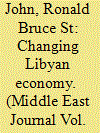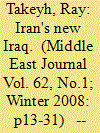| Srl | Item |
| 1 |
ID:
081979


|
|
|
|
|
| Publication |
2008.
|
| Summary/Abstract |
Once the United Nations suspended its sanctions regime in April 1999, Libya began to introduce socioeconomic reforms aimed at liberalizing its economy. Greeted with some skepticism, the liberalization movement gained momentum as Libya first resolved the Lockerbie dispute and then renounced unconventional weapons. Considerable progress was made in the ensuing years; however it was notably uneven, with reform to the oil and gas industry outstripping initiatives in other economic sectors. Liberalization efforts continue but they are increasingly threatened by resistance to political reform
|
|
|
|
|
|
|
|
|
|
|
|
|
|
|
|
| 2 |
ID:
081980


|
|
|
|
|
| Publication |
2008.
|
| Summary/Abstract |
At the present time, there are no clear outcomes in Turkey's European Union (EU) accession process. By the end of the two years following the rise of the pro-Islamist Justice and Development Party (AKP) to the government in 2002, Turkey's accession process entered into a stalemate. Potent political opposition to the Turkish candidacy in Europe has escalated, despite a staunch Turkish political commitment since 1999 to meet the Copenhagen Criteria for admission. In this article, we argue that Turkey's EU accession process has contributed to opening political spaces for Islamism and ethno-nationalism in the country, ironically producing societal and political forces undermining Turkish membership. We inquire first into the practical reasons obstructing Turkey's membership to the Union and second into the societal and political implications of the continuation of the bleak possibility of EU membership for Turkey. As far as the latter is considered, our focus is limited to an analysis of the politicization and institutionalization of the ethnic and Islamist conservative politics in Turkey within the process of "liberal democracy."
|
|
|
|
|
|
|
|
|
|
|
|
|
|
|
|
| 3 |
ID:
081976


|
|
|
|
|
| Publication |
2008.
|
| Summary/Abstract |
The US invasion of Iraq has revolutionized the strategic architecture of the Persian Gulf in a manner that is still difficult to fully appreciate. Among the relationships that have been dramatically altered by America's move are the ties between Iran and Iraq. A critical examination reveals that more than territorial disputes or contending hegemonic aspirations, it was ideology that caused tension and ultimately war between these two states from 1980-88
|
|
|
|
|
|
|
|
|
|
|
|
|
|
|
|
| 4 |
ID:
081978


|
|
|
|
|
| Publication |
2008.
|
| Summary/Abstract |
This article examines Libya's nuclear rollback in light of sources that have emerged since December 2003. These sources offer new perspectives on the Libyan regime's motives for pursuing nuclear weapons, why it concluded that the effort to acquire nuclear weapons was becoming a threat to national security, and how this reflects on Libya's security policy under Mu'ammar al-Qadhafi. It will be argued that this particular case illustrates a recent trend towards post-revolutionary realpolitik in Libyan foreign and security policy
|
|
|
|
|
|
|
|
|
|
|
|
|
|
|
|
| 5 |
ID:
081977


|
|
|
|
|
| Publication |
2008.
|
| Summary/Abstract |
Iran and Syria were instrumental in the creation of Lebanese Hizbullah 25 years ago, and although all three actors have faced significant outside pressures during that time, their relationship has endured. Yet the relationship has evolved, too, with Hizbullah now a major player in Lebanese politics due to its constituent outreach and its maintenance of a militia that rivals the national army. This article examines the evolutionary process and assesses its implications for policymakers.
|
|
|
|
|
|
|
|
|
|
|
|
|
|
|
|